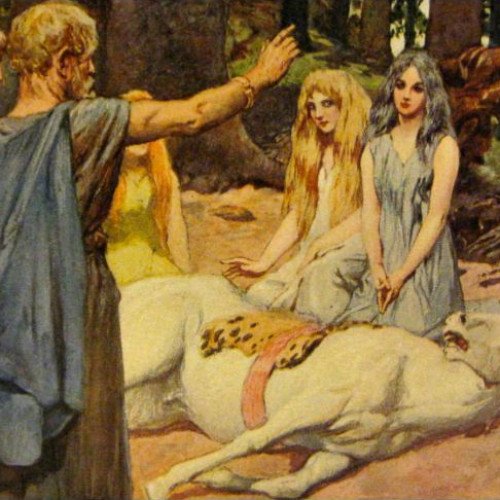German (mythology) VS Asteria (mythology)

German (mythology)
German (GERMAN, pronounced [ˈɡerman]) is a South Slavic mythological being, recorded in the folklore of eastern Serbia and northern Bulgaria. He is a male spirit associated with bringing rain and hail. His influence on these precipitations can be positive, resulting in the amount of rain beneficial for agriculture, or negative, with a drought, downpours, or hail. Rituals connected with German included making a doll intended to represent this personage. This effigy of German, made of rags, fired clay, or dried fruits, was rather large, usually with a distinct representation of the male genitals. It was produced and used in rituals exclusively by girls or young women.In Eastern Serbia , when a drought developed, girls would make such a doll, and bring it to a river bank. Depending on the regional custom, they would either bury it by the river, or put it in a little coffin and let it float down the river. Two of the girls would then start lamenting for the doll. Asked by the others why they were crying, they would answer, "We are crying for German; because of the drought German has died so that the rain may fall." If the amount of rain falling should then become excessive, the doll would be dug up again. In northern Bulgaria, the rituals with German usually followed immediately after the Dodola rituals, but could be performed independently from them. In some villages they were carried out on the Feast of Saint Germanus. Girls would make the doll, 20 to 50 cm long, and lay it on a slate or in a little coffin. Having adorned it with flowers, they would bury it with funeral observances. After three, nine, or forty days, the doll was dug up and thrown into water.People would also try to ward off destructive summer hailstorms by placating German with a ritual performed on Christmas Eve. This ritual was recorded in the area around Pirot at the beginning of the 20th century. Immediately before the start of the Christmas Eve dinner, the head of the household would go out to his woodpile, to invite German to dinner. He would take with him a loaf of bread called "good luck", prepared particularly for this ritual, slivovitz, wine, and a wax candle. At the woodpile, he would shout three times, "German, German, wherever you are, come to dinner right now, and in the summer do not let me see your eyes anywhere!" He would then light the candle, take a sip of slivovitz, taste some bread, drink wine, and go back into his house. Asked how he had fared in his encounter with German, he would answer, "He came, so we dined and drank amply of slivovitz and wine, and then we parted."German, who dies so that the nature may regenerate with the falling of rain, can be understood as a spirit of vegetation, dying and then resurrecting with the revival of vegetation. His distinctly represented male genitals symbolize fertility. The doll of German is presumably a metaphorical replacement of the former human sacrifice. It can be included among the Slavic sacrificial dolls, together with the dolls of Yarilo, Kostroma, and Morena.In Christianized folk beliefs German is identified with Saint Germanus. This saint is associated with the protection from hail, and occasionally from lightning, though the latter was generally ascribed to Saint Elijah.
Statistics for this Xoptio

Asteria (mythology)
In Greek mythology, Asteria (; Ancient Greek: Ἀστερία, "of the stars, starry one") was a name attributed to the following eleven individuals: Asteria, a Titaness. Asteria or Astris, daughter of Helios and Clymene or Ceto, one of the Heliades. She married the river god Hydaspes (the modern Jhelum River) and became mother of Deriades, king in India. Asteria, one of the Danaïdes, daughters of Danaus who, with one exception, murdered their husbands on their wedding nights. She was, briefly, the bride of Chaetus. Asteria, one of the Alkyonides. Along with her sisters, she flung herself into the sea and was transformed into a kingfisher. Asteria, daughter of Hydeus, was the mother of Hydissos by Bellerophon. Her son is known for having founded a city in Caria which was named after him. Asteria, daughter of Coronus, and Apollo were possible parents of the seer Idmon. Asteria or Asterodia, mother of Crisus and Panopeus by Phocus. Asteria, daughter of Teucer and Eune of Cyprus. Asteria, the ninth Amazon killed by Heracles when he came for Hippolyte's girdle. Asteria, an Athenian maiden who was one of the would-be sacrificial victims of Minotaur, portrayed in a vase painting.Christoph Willibald Gluck gave the name Asteria to one of the characters in his 1765 opera Telemaco, though the name did not appear in Homer's Odyssey on which the opera was based.